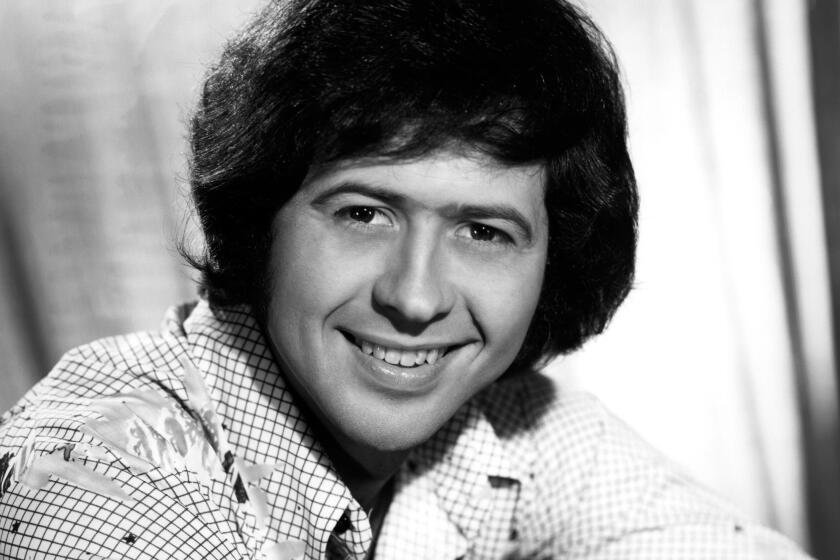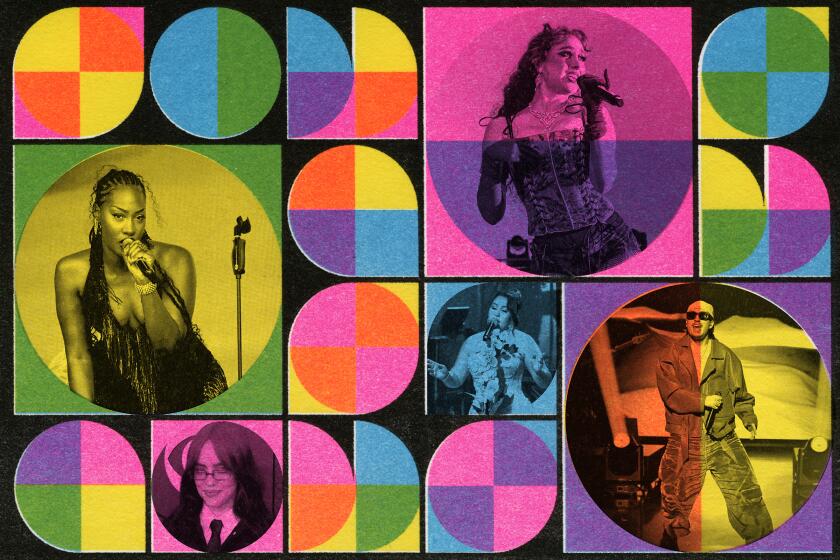O.C. POP MUSIC REVIEWS : Chiming the Winds of Change : Alternative-rock bands Don’t Mean Maybe and Eli Riddle explore some new--and old--territory at Bogart’s in Long Beach.
LONG BEACH — This is a time of transition for two of Orange County’s best alternative-rock bands, Don’t Mean Maybe and Eli Riddle (formerly Eggplant). Sharing a bill Thursday night at Bogart’s, both seemed to be thriving on the challenge of change.
Top-billed Don’t Mean Maybe, which was celebrating the release of its second album, “Real Good Life,” has changed significantly since the addition of drummer Ron Sloan early this year.
On record, and in the band’s 45-minute set at Bogart’s, Sloan set down a loosely rolling, expansive rhythmic foundation full of almost-constant cymbal flashes--a style suited to the more straightforward, melodic rock approach that emerges on the new album. The band’s former drummer, Jeff Fairbanks, favored hammering, frenzied dashes that carried the beat in straight-line segments, zigging and zagging at sharp angles.
The revamped Don’t Mean Maybe hasn’t changed entirely. It still deploys frequent shifts in tempo and dynamics and goes for episodic song structures built on Mark Andrea’s changeable, cleanly etched guitar riffs. But the music is more consistently melodic, Andrea is increasingly inclined to sing instead of holler, and most of the songs unfold in less hyperkinetic fashion than on the band’s two previous releases, a 1989 EP, and a 1990 album, “Live Sample.”
Besides changing its musical approach, Don’t Mean Maybe also is changing its address. While premiering its new album at Bogart’s, the Orange County band was saying farewell to old haunts. This weekend, Don’t Mean Maybe will complete its relocation to Northern California (bassist John Hawthorne and singer-guitarist Mark Andrea will be based in Santa Cruz, where they attended college before returning to Orange County to form Don’t Mean Maybe; Sloan, formerly of Fullerton, has been living in San Francisco for several years).
The release of “Real Good Life” also marks a transition to full-time music making for the band members, who previously had worked day jobs. Hawthorne said after the show that Don’t Mean Maybe plans to spend about half its time touring.
“If we’re going to be touring five or six months a year, it’d be nice to come back to (Santa Cruz) instead of being in Orange County with all that traffic,” he said. “I get really stressed out in that kind of environment.”
“When I’m up north, I defend Orange County” against detractors who lampoon its materialistic ethic, Andrea said. “I tell them that (compared to the cloistered life of a college town) it’s the real world. But when I’m down here, I don’t like it. Orange County is (based on) conforming, and they don’t want to do anything fun and adventurous, like have cool clubs.”
For Andrea, the band’s main songwriter, moving must signify much more than a matter of finding new scenery. The core issue he confronts on “Real Good Life” is how to escape regimentation, expectations and standardization imposed from the outside and live a life of one’s own. One way to attempt to break out of the psychological boxes depicted on the album is to get up and go, as DMM is doing.
After a well-played but somewhat circumspect first half, Don’t Mean Maybe’s show gained passion and immediacy in a series of songs from the new album that confront such entrapment head-on. “Bliss” was a lament for Orange County’s transformation into a paved paradise. There was a touch of Creedence Clearwater Revival jangle that fit the lyrics’ idyllic fantasy of a suburb where traffic flows easily and mini-malls have been demolished.
“Your World” came next, replacing the idyll with a biting expression of alienation. Then “Cancel,” one of the band’s best songs, brought the tension to a head. Andrea let his anger at conformity flash: “My father looks just like me, he’s not the person I’m gonna be / I’m gonna cancel his chosen plans, make some decisions with no demands.” The song hit with a Who-like explosiveness, the trio’s speeding motion painting a picture of freedom and self-reliance.
But Don’t Mean Maybe also inserted a couple of slower, quieter instrumental passages into “Cancel.” In blunting the song’s rocking thrust, those bits undercut the song’s rebellious certitude. Yes, the singer was vowing to “make some decisions” and “cancel” the checks on his freedom. But the halting, unresolved character of the quieter passages suggested that making a decision intellectually is one thing, while backing it up with action is quite another.
While Andrea was far from a lump on stage, he has shown more exuberance in the past. More movement and acting out would help. Also, some interesting guitar ideas got cut short before they had been explored fully. It wouldn’t hurt to stretch out for a few minutes once or twice a set. The omission of “She Just Gets Around,” a forlorn ballad that ends “Real Good Life” on a touching note, showed that Don’t Mean Maybe still has some hesitancy about putting all its feelings on the line.
Eli Riddle was playing only its second show since three of its four members splintered away from Eggplant several months ago (the fourth Eggplant member, Jeff Beals, will debut his new band, the Super 8 Project, at Bogart’s on Sept. 23).
Part of Eggplant’s appeal lies in the contrasting but complementary temperaments of two singer-songwriters, Beals and Jon Melkerson, and in their ability to harmonize well as singers. Beals usually offered whimsy and humor, while Melkerson’s songs depicted reticent, confused Everymen engaged in the struggle to make some sense of life and find stable ground on which to stand.
Now Melkerson is in full control of the songs. The 11 numbers, only one of which has already surfaced on an Eggplant album, reflected the same preoccupations he showed in the past, with perhaps more emphasis on the pain and yearning that spring from imperfectly requited love.
If Eli Riddle (the title of one of Melkerson’s songs from the first Eggplant album), is less flexible than Eggplant when it comes to moods and vocals, its musicianship has taken a big leap forward over the old band. The new member, bassist David Black, is a tremendous find.
Black, 39, plays bass with the Pacific Symphony, but he also has been part of the Orange County avant-garde rock scene as a member of D.O.M.E.S. and Glue Factory. Jeff Fairbanks, the former Don’t Mean Maybe drummer who plays with Black in Glue Factory, recommended the bassist to Eggplant last year when it wanted to add an acoustic bowed bass to “The Wild Ones (Cycle on the Lawn),” a tender ballad on its “Sad Astrology” album.
At Bogart’s, Black’s electric bass was in constant, propulsive motion, a firm, flexible, melodically prominent presence that prodded the music and injected a flash of energy at every moment. And the bass never intruded on the other players’ space. Melkerson, an outstanding guitar soloist, played more freely and luxuriantly than he ever did in Eggplant, stretching out to pose musical ideas, then probe them in his typically tasteful way. If Melkerson’s singing depicts characters who are unsure and befuddled, not quite able to articulate clearly what they feel, his guitar taps into a free flow of expression that their tongues can’t hope to find.
Second guitarist John Kelly also got in his share of sharp licks, often picking up one of Melkerson’s cleanly played figures and restating it with grittier guitar voicings. Even with all that ear-catching string work swirling around, the beat remained paramount, thanks to Dave Tabone’s knack for drumming that was active yet lean, muscular and yet sensitive to dynamics.
Melkerson sang in a flat, nasal, Midwestern-sounding tone that was often poignant and always well-suited to the ordinary-mixed-up-guy character he plays in his songs. Better harmony support is needed, though, to bring the band’s vocals in balance with its instrumental strength.
The new songs were promising on first hearing, especially “Wire,” a dark, urgent garage-rocker, and “All We Know,” which capped the set with an optimistic sense of lift. On both of those songs, Black’s bass and Melkerson’s guitar were like a couple of racing cars jostling each other around a dangerous curve. The band should highlight exciting moments like those with visual punctuation--if instrumental lines are moving in tandem, why not have the players join close quarters, too, instead of holding their spread-out positions on the stage? Eggplant never was much on stagecraft, but shyness can be outgrown.
Playing last on the three-band bill was the instrumental jazz/alternative rock trio, Bazooka, which was reviewed recently.
More to Read
The biggest entertainment stories
Get our big stories about Hollywood, film, television, music, arts, culture and more right in your inbox as soon as they publish.
You may occasionally receive promotional content from the Los Angeles Times.










